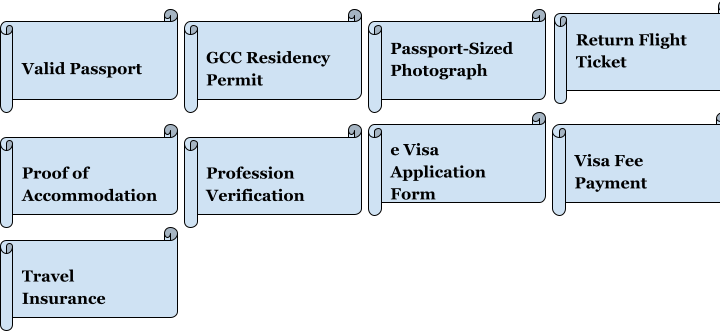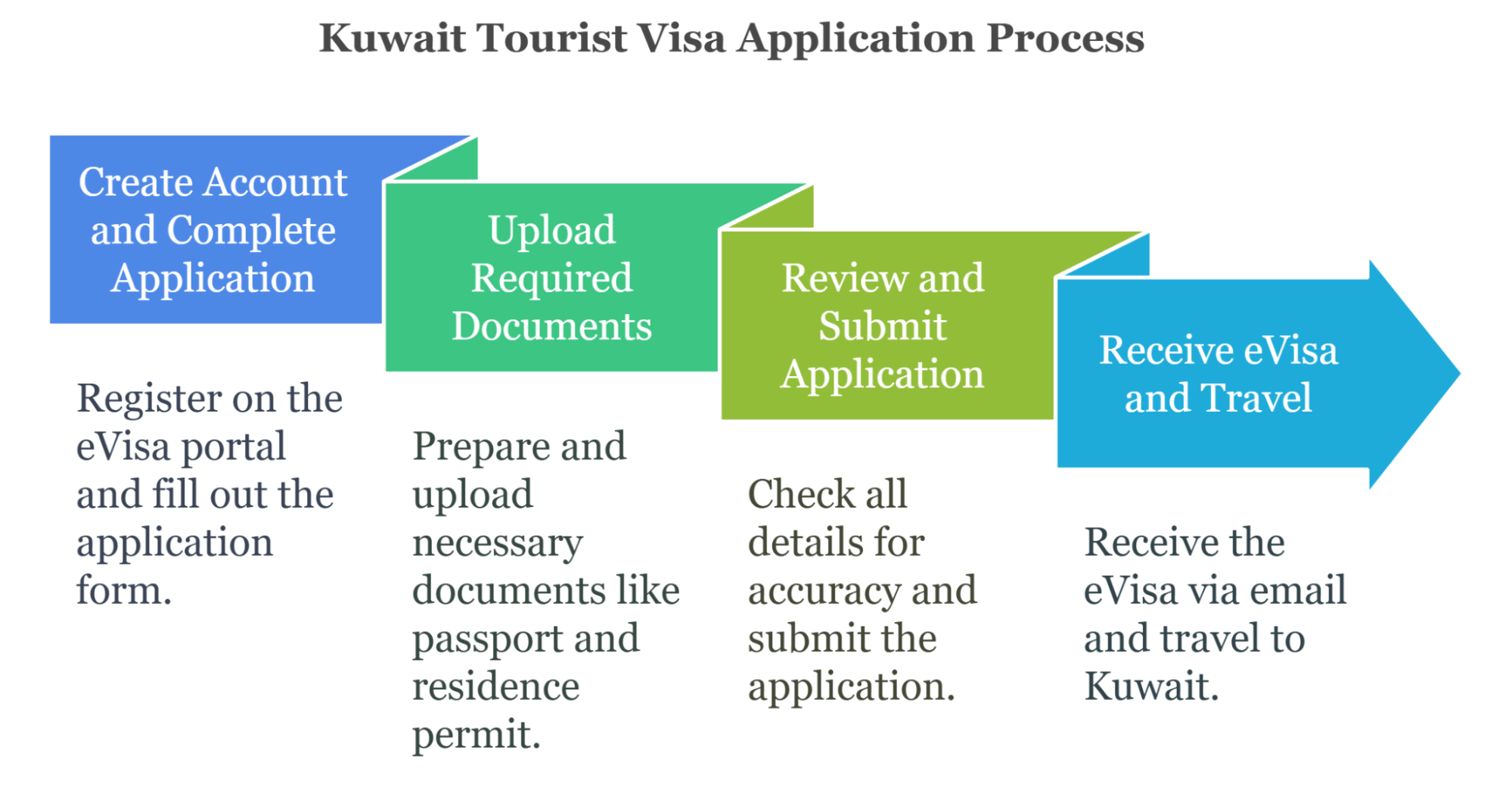Kuwait offers a streamlined visa process for both Gulf Cooperation Council (GCC) nationals and expatriates residing in GCC countries.
While citizens of GCC states enjoy visa-free entry, expatriate residents must adhere to specific guidelines for obtaining a tourist visa.
This guide provides an in-depth overview of the latest visa policies, including eligibility criteria, required documents, and application procedures for those planning a visit to Kuwait.
Whether you are a GCC national or a resident looking to travel to Kuwait for tourism, this updated information will ensure a smooth and informed experience.
Eligibility Criteria for GCC Nationals and Residents
Foreign nationals living in any of the following GCC countries can apply for a Kuwait tourist visa if they meet the conditions below:
GCC Countries
|
United Arab Emirates (UAE), Saudi Arabia, Qatar, Oman, Bahrain |
Eligibility Conditions
Foreign nationals living in GCC countries can apply for a Kuwait tourist visa if they meet the following conditions:
- Valid GCC Residency Permit: You must have a valid residence permit from a GCC country with at least six months left before it expires.
- Eligible Nationality: Your nationality should be on Kuwait’s approved list for the eVisa or visa-on-arrival program. If your country is not on the list, you will need to apply through a Kuwaiti embassy.
- Recognized Profession: Your job or profession must be one that Kuwaiti immigration accepts. This is usually confirmed by your GCC residency permit or an employment letter.
- Purpose of Visit: The visa is for tourism, family visits, or short stays only. It does not allow you to work or stay long term.
- Passport Validity: Your passport must be valid for at least six months from your planned date of entry to Kuwait.
Required Documents for Kuwait Tourist Visa (GCC Residents)
If you are a foreign resident of a Gulf Cooperation Council (GCC) country planning to visit Kuwait for tourism, you will need to apply for a tourist visa. Below is a clear explanation of the documents typically required to support your application.

- Valid Passport: Your passport must be valid for at least six months from your date of entry into Kuwait. It should be machine-readable and in good condition. Handwritten or damaged passports may not be accepted.
- GCC Residency Permit: A valid residence permit from a GCC country is required, with a minimum validity of more than six months. This document should also show your profession, which must be one of those accepted by Kuwaiti authorities.
- Passport-Sized Photograph: You will need a recent passport-size photo with a white background. The photo should be taken within the last six months and clearly show your full face without sunglasses or head coverings (unless for religious reasons).
- Return Flight Ticket: A confirmed round-trip ticket is required to demonstrate your intention to leave Kuwait after your visit. This supports the temporary nature of your travel.
- Proof of Accommodation: You must provide evidence of where you will stay during your time in Kuwait. This can be a hotel booking or an invitation letter from a resident host, including their address, contact details, and proof of residency or citizenship.
- Profession Verification: Depending on your nationality and residency, you may be asked to submit proof of your profession. This can include a work ID, employment letter, or other documents confirming your job title matches Kuwait’s eligible list.
- eVisa Application Form: You must complete the online visa application accurately. All personal details must match your passport and other documents to avoid delays or rejection.
- Visa Fee Payment: An application fee is required and must be paid during the online application process. The amount is set by the Kuwaiti authorities and is non-refundable.
- Optional: Travel Insurance: Though not mandatory, it is recommended to have travel insurance that covers your stay. It can offer protection in case of health emergencies or travel-related issues.
Application Process for a Kuwait Tourist Visa for GCC Nationals and Residents
To apply for a Kuwait tourist visa as a GCC resident, follow these 4 simple steps:
Register and Complete the Application
Access the Kuwait eVisa portal, register using email and phone number, and fill out the application form with accurate personal, residency, and travel information.
Upload Required Documents
Submit the required documents through the portal. Ensure that all uploads are clear, complete, and comply with the stated requirements.
Review and Submit Your Application
Carefully review your application to confirm all details and documents are correct. Proceed to submit the application and complete the online payment.
Receive Your eVisa and Travel to Kuwait
Once approved, your eVisa will be sent via email. Print a copy and present it along with your passport and valid GCC residency permit upon arrival in Kuwait.

Validity of Kuwait Tourist Visa for GCC Residents
The Kuwait Tourist eVisa for GCC residents is designed to facilitate travel for expatriates legally residing in Gulf Cooperation Council countries. The validity details are as follows:
Visa Validity Before Entry
The eVisa is valid for 30 days from the date of issuance. Applicants must enter Kuwait within this 30-day period, otherwise the visa will expire and require reapplication.
Duration of Stay in Kuwait
Upon arrival, holders of the tourist eVisa are permitted to stay for a maximum of 30 days. The 30-day period commences from the date of entry. The visa is single-entry, meaning re-entry after departure is not permitted on the same visa.
Processing Time and Fees for Kuwait Tourist Visa (GCC Residents)
When planning a visit to Kuwait, understanding the processing time and fees associated with the tourist visa application is essential for a smooth and timely travel experience.
The process is designed to be user-friendly and transparent, ensuring that GCC residents can obtain their visa with ease.
Processing Time
The Kuwait tourist eVisa application for GCC residents is processed electronically through the official government portal.
Processing times are generally swift, but may vary depending on the volume of applications and the need for any additional verification. It is advisable to apply well in advance of your intended travel date to avoid any unexpected delays.
Fees
The visa application may include administrative fees, which can vary according to Kuwait’s Ministry of Interior policies and the applicant’s eligibility. Some GCC residents may be eligible for reduced or waived fees.
All applicable fees are clearly displayed during the online application process, ensuring full transparency before payment.
Benefits of Kuwait's Tourist Visa for GCC Residents
Kuwait’s tourist visa policy for residents of GCC countries offers several practical advantages. Designed to simplify travel for expatriates across the Gulf region, this visa is convenient, accessible, and well-suited for short-term visits.
- Easy Online Application: Apply entirely through Kuwait’s eVisa website. No embassy visits or paperwork required—fast and hassle-free.
- Quick Processing: Most visas are approved within a few working days, making it easy to plan trips on short notice.
- Up to 30 Days Stay: Enjoy a generous stay period of up to 30 days, perfect for tourism, visiting family, or short-term personal visits.
- Open to Many Nationalities: GCC residents from a wide range of countries are eligible, as long as they meet basic requirements like valid profession and residency.
- Supports Regional Travel: Makes weekend or short trips from neighboring GCC countries to Kuwait easier and more attractive.
- Clear Requirements: Straightforward rules on documents, residency, and professions make the process predictable and easy to understand.
Common Reasons for Kuwait Tourist Visa Rejection (GCC Residents)

Even though the application process is straightforward, certain errors or ineligibilities can result in a tourist visa rejection. Below are the most common reasons:
- Ineligible Profession: Only certain professions are approved. If your job title isn't on the list, your application may be denied.
- Invalid Residency Permit:Your GCC residency must be valid for at least 6 months. Expired or soon-to-expire permits lead to rejection.
- Passport Issues: Passports must be valid for more than 6 months. Damaged or expired passports are not accepted.
- Mismatched Information: Typos or incorrect data (e.g., name, residency details, profession) can trigger automatic rejection.
- Immigration History: Past visa overstays, deportation, or legal issues in Kuwait or other GCC countries can result in denial.
- Restricted Nationality: Some nationalities may not be eligible even if they hold GCC residency, based on Kuwait’s internal policies.
- Incomplete Documents: Missing or unclear uploads, such as passport scans or residency cards, can invalidate the application.
- Security Flags: If flagged for legal or security concerns, the visa may be rejected without detailed explanation.
- Already Inside Kuwait: You cannot apply for a tourist visa if you're already in the country on another visa.
Tips for a Successful Trip to Kuwait (GCC Residents on Tourist eVisa)
Planning to visit Kuwait on a tourist evisa as a GCC resident? A smooth, enjoyable trip starts with preparation.
From ensuring your documents are in order to understanding local customs, these practical tips will help you avoid delays, comply with entry rules, and make the most of your stay in Kuwait.
✔ Apply Early: Submit your eVisa application a few days in advance to avoid last-minute processing issues.
✔ Check Profession Eligibility: Only specific professions are allowed under Kuwait’s eVisa system. Double-check that your job title is on the approved list.
✔ Confirm Document Validity: Your passport and GCC residency card should be valid for at least 6 months from your planned date of entry.
✔ Keep Printed Copies: Bring printed versions of your visa approval, passport, and residency card to present at immigration checkpoints.
✔ Respect Local Laws and Culture: Kuwait is conservative. Dress modestly, avoid public displays of affection, and be especially respectful during Ramadan.
✔ Be Mindful of Entry/Exit Rules: Enter Kuwait only through approved points (land borders, airports), and never overstay your visa duration.
✔ Book Accommodation in Advance: You may be asked to show proof of where you’ll be staying. Have hotel reservations or a host address ready.
✔ Carry Travel Insurance: Optional but recommended—insurance can protect you in case of unexpected medical or travel-related emergencies.
✔ Know Emergency Contacts: Keep the number of your embassy and Kuwait’s emergency hotline (112) saved for quick access if needed.
Frequently Asked Questions (FAQ)
No. Only residents of GCC countries whose profession is listed as eligible by Kuwait's Ministry of Interior can apply. Unlisted professions are typically not accepted, even if the residency is valid.
Your passport and GCC residency card must each be valid for at least 6 months from the date you plan to enter Kuwait. Applications with shorter validity are usually rejected.
Each traveler, including spouse and children, must apply for their own visa. Dependent family members may apply if their sponsor’s profession qualifies and they are listed as dependents.
Currently, tourist visas for GCC residents are not extendable. You must leave Kuwait before the visa expires (typically within 30 days).
Overstaying may result in fines, legal action, deportation, or future entry bans. Always track your visa expiry date and exit the country on time.
No. The tourist visa is strictly for tourism, family visits, or short personal trips. It does not permit employment, business activities, or job searching.
You can check the status of your visa on Kuwait’s eVisa Application Status portal using your order ID and passport number. Updates are usually provided within a few business days.
Content Disclaimer: Although this information was last updated in May 2025, we recommend verifying with the appropriate agencies, embassies, and airlines to ensure complete accuracy regarding your travel plans.

To help us improve